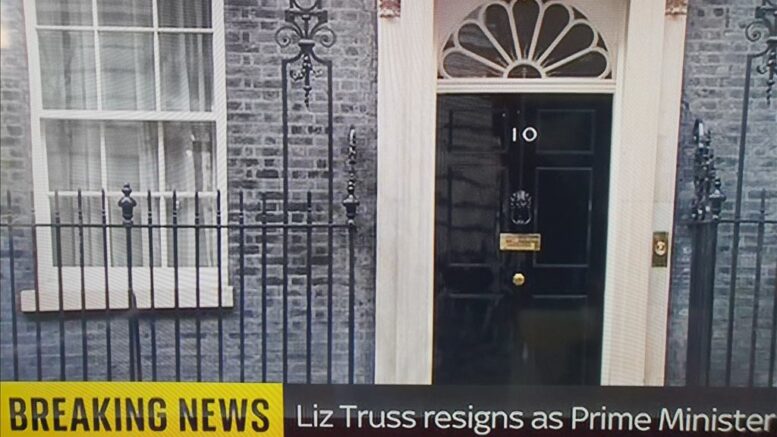With Liz Truss gone, Britain’s chaotic Conservative government is looking for its third prime minister this year and the sixth since Brexit, writes Murray Ritchie. Opposition parties scream for a general election as the country sinks into an economic quagmire. How on earth did it come to this?
Don’t laugh, but so unpopular are the British Tories that an opinion poll has just suggested that the independence-seeking Scottish National Party could become His Majesty’s Loyal Opposition after the next UK general election. It really is that bad for the broken Tory party which is now in the process of destroying itself in an orgy of infighting and self-loathing.
Clawing back the tiniest electoral credibility seems impossible even for a political party which, above all others in Europe, had a genius for clinging to power against the odds. But this time the Tories are running at close to 40 points behind Labour. Their chances don’t exactly look rosy.
Whom to blame for this political calamity which has been a long time coming? Well, the guilty know who they are, and two former prime ministers called them out years ago. John Major called them “bastards” and David Cameron let it be known he thought them “swivel-eyed loons”.
Undeniably, today’s political tragicomedy in Britain has its roots firmly in the decades of rows and disputes leading up to that fateful referendum result and a hard Brexit, now ever-more widely exposed as a national disaster
They are of course the Tories’ Eurosceptics and Europhobes, to be found mainly on the rigid right of the party. The same who campaigned for Brexit and, when they succeeded, split the party irreparably down the middle.
Those of us who long believed the Tories would be destroyed by their festering divisions over the EU were right. The consequence is happening now before our eyes. All we got wrong was the timing.
If David Cameron had not been so spooked by the hard-line Europhobe Nigel Farage’s army of xenophobes in his UK Independence Party, he would not have gambled on winning the European referendum of 2016. When he lost, and Brexit happened, Britain’s slide into political and economic chaos began.
Undeniably, today’s political tragicomedy in Britain has its roots firmly in the decades of rows and disputes leading up to that fateful referendum result and a hard Brexit, now ever-more widely exposed as a national disaster. For many years the anti-Europeans plotted to have pro-EU MPs deselected and in the end they grew successful enough to wield huge influence not just in the constituencies but in the House of Commons.
When the supremely deceitful opportunist Boris Johnson calculated the force of this Europhobic tide in his party, he harnessed it as a means to Brexit. To his own surprise and personal gain, he won the referendum on the back of spurious claims and promises which imposed on Britain a crushing economic burden.
UK manufacturing is down, along with exports, recession is looming, the promised trade deals with other countries to replace lost business with the EU have produced nothing of significant value. The cost of living is torturing families, inflation is above 10 per cent, trade unions are in open rebellion.
Truss’s stupid tax cutting promises lasted two days before the markets forced a humiliating reversal. The pound hit a 37-year low.
No government in modern times has been as unpopular, none has damaged the economy so severely so quickly, and none has been mocked so widely for its astonishing incompetence
Today’s British humiliation has been gathering force for more than 30 years, from the time the European Community transformed itself through the Maastricht treaty into the European Union. To some Tories this was a sign of sensible and constructive political co-operation with Britain’s European partners. But to others it was the first step towards an imagined European superstate involving the unacceptable transfer of sovereignty to Brussels.
Of course, no-one believes such a superstate will happen any time soon, or at all, but Tory Europhobes are not about to be assured. And like most Brexiters they are unwilling to admit they might have made a dreadful political misjudgement.
This civil unrest became civil war, yet still the Tories managed the trick of returning to power when the Labour years under Tony Blair and Gordon Brown ended dismally. Until now. Even after the farce of Truss the Tories are determined to cling to power in blatant defiance of a national outcry of naked hostility – only intensified by their understandable refusal to countenance a general election in which they would be wiped out.
But this time it looks a challenge too far even for this most resilient of political parties. After 12 years in government, they are heading inexorably for the electoral rocks. No government in modern times has been as unpopular, none has damaged the economy so severely so quickly, and none has been mocked so widely for its astonishing incompetence.
Some respected commentators are talking of the destruction of the Conservative Party and watching it go the way of the Liberals a century ago. The Tories have two years to save themselves unless by some unexpected earthquake a general election is forced on them and they are inevitably annihilated. By shamelessly refusing to respect public opinion they are stoking even more hostility.
A third prime minister this year to replace the hapless Truss will not be enough. In a bizarrely undemocratic process, she won the premiership with a string of absurdly impractical promises made to a small coterie of mainly elderly, well off, impressionable party members mostly living in the comfortable English home counties in and around London – the only people allowed a vote for the leader under the party’s eccentric rules. Most Tory MPs voted against her and wanted her gone.
Now Tory MPs have the nerve to consider the return of Boris Johnson, the prime minister ousted for his distant acquaintance with moral decency, competence and truth telling.
With Boris Johnson a potential contender to return as PM, here’s the last tracker data on his performance as PM prior to his departure
— YouGov (@YouGov) October 21, 2022
Likeable: -13 net score
Strong leader: -24
Decisive: -35
Doing well as PM: -43
Competent: -43
Trustworthy: -65https://t.co/PgiDsvFqsC pic.twitter.com/WNbEpuxjp2
Truss was a European Remainer who changed her spots to suit her ambitions. Her choice of Chancellor of the Exchequer lasted just days. She fired him for supporting her own policies and to counter internal party outrage at her ridiculed Trussonomics. The latest chancellor, Jeremy Hunt, is also a Remainer, a fact which further infuriates the Tories last-ditch Eurosceptics. And so, it goes on.
An obvious way to help Britain’s busted economy would be to rejoin the EU’s single market but even that is a dubious prospect for the Tories. Labour’s promise to “make Brexit work” was a fearful response to losing pro-Brexit seats mainly in working class northern England. That might change now that northern voters show signs of repenting their Brexit flirtation.
Would Labour have the nerve brazenly to back a return to the single market after winning the election? Quite possibly, since there is nothing the Tories could do about it.





